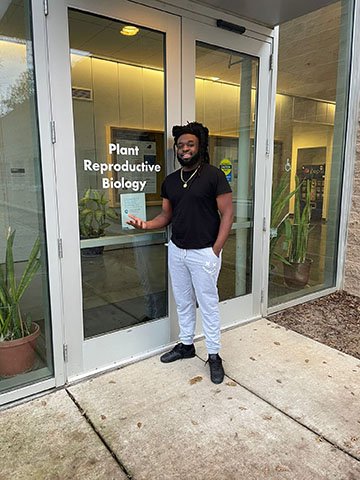A football game and a love for animals convinced Darrell Sparks to enroll at Fort Valley State University (FVSU).
Sparks, a native of Columbus, Georgia, earned his Bachelor of Science degree in animal science (2019) and Master of Science degree in plant biotechnology (2022) from FVSU’s College of Agriculture, Family Sciences and Technology.
Prior to enrolling at FVSU, Sparks worked two jobs for two years. This included working as a custodian at the main post exchange in Fort Benning, Georgia, and at a local chicken plant in Pine Mountain, Georgia, where he worked the overnight shift.
The 31-year-old is currently a doctoral student at the University of California-Davis (UC Davis) in Davis, California. He took time out of his busy schedule to briefly discuss his experience as an FVSU student, why he selected the middle Georgia institution and his matriculation to The Golden State to further his studies.
Why did you decide to attend FVSU?
As a small child, I would always go to the Fountain City Classic football game in Columbus, Georgia, featuring Albany State University and Fort Valley State University. For some reason, I was always drawn to root for Fort Valley even though I knew nothing about the school. When I got older and decided to go to college, FVSU was my first choice.
What inspired you or who influenced you to select your undergraduate major?
I have always loved animals. As a young child I would adopt injured animals, and that inspired my dream to be a veterinarian. So, when I started my undergrad degree, I chose veterinary technology, but I was later advised to switch my major to animal science. I graduated with my animal science degree in December of 2019.
How would you describe your undergraduate experience at FVSU?
I had an untraditional pathway to college because I worked for two years before I started. Coming to campus my freshman year was scary, but exciting at the same time. I made great connections with students and faculty alike and FVSU feels like family. The experience that I gained at FVSU laid the foundation and opened the door for where I am today.
Who would you consider to be your mentor(s) at FVSU?
Dr. Brou Kouakou, Dr. Sarwan Dhir, Dr. Steven Samuels, Dr. Hari Singh, Dr. Mohammed Ibrahim, Dr. Nirmal Joshee and Dr. Jacquez Surrency were all great mentors to me during my undergraduate and graduate studies at FVSU.

Did you participate in any extracurricular activities while you were a student at FVSU?
I was a part of many clubs and extracurricular activities including Future Farmers of America (FFA), the Animal Science Club, Emerging Leaders Interactive Training and Experience (Elite) Program and the Minorities in Agriculture Natural Resources and Related Science (MANNRS).
Did you have an internship(s) at FVSU? If yes, where were they located and what were your responsibilities?
While in undergrad, I took a study abroad trip to Honduras with other animal science majors. There, we learned about international agriculture. I also participated in an internship at the University of Missouri in Columbia, Missouri. There, I measured the root growth under drought stress on wheat seeds. During the master’s program at FVSU, I participated in an internship with UC Davis to study the spread and impact of Ralstonia (a bacterium that causes plants to wilt) in agriculture.
Why did you select the university of California Davis (UC Davis) to pursue your doctorate degree?
The internship at UC Davis, called Plant Agricultural Biology Graduate Admissions Pathways Program (PABGAP), offers a “pathway” into UC Davis by funding five years of a Ph.D. program to any of its participants. And since UC Davis is a world leader in plant research, I figured that it would be the perfect school to continue my education and receive my doctoral degree.
What is your major at UC Davis? How do you feel about representing FVSU at UC Davis?
I am part of the graduate group of Horticulture and Agronomy. UC Davis wasn’t created for people like me. My presence alone challenges stereotypes and says that I beat the odds. I have the unique opportunity to help forge a path for the bright, Black scholars behind me and I take it seriously. This opportunity is humbling, and it feels amazing.
What advice would you give to a student seeking a graduate degree once they complete their undergraduate studies?
To have a plan going into grad school for what you want to do for your future, and while you’re in graduate school prepare for your future career plan.
Can you tell us your plans once you complete your studies at UC Davis?
I want to help my community by providing access to quality food and alternatives to medicines and pharmaceuticals using chemicals to those in the form of herbal supplements and natural remedies.

